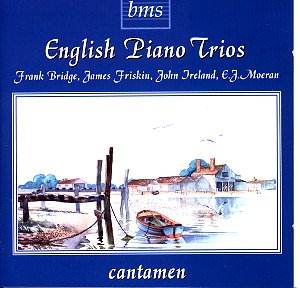This is disc is a superb advert for both the
sterling work done by the British Music Society, all of whose
discs can now be obtained through Musicweb, and for four valuable
pieces of chamber music. The three shortest, by Bridge, Ireland
and Friskin are bound by the common thread of being written for
and successful in the influential Cobbett "Phantasy" Competition.
The remaining work, Moeran's Piano Trio is one of the finest
English chamber compositions you could hear and, despite being
a relatively early in his oeuvre, is in a totally idiomatic
vein for a composer whose haunting evocations of the landscape
and folk music of the lonely places of the Norfolk and west Irish
coastlines have long since gripped this listener. There is a more
recent recording of the Trio, accompanying the two superb
string quartets, on a very desirable ASV disc, but this performance
by Cantamen is more than adequate and possibly a greater labour
of love at the time of recording. Michael Jones' intelligent booklet
notes find some overlap with the equivalent music of Moeran's
older friend John Ireland (his trio is also recorded here) but
even a casual listen should reveal a unique musical mind at work.
Within its four movements, the work reveals many of the trademarks
of its creator, from the dancing, jig-like rhythms of the faster
music to the nostalgic laments of the slower sections. As in many
of his best works, the great Symphony in G minor is a case
in point, Moeran makes explicit the close connections between
the folk traditions of Ireland and England, and like the aforementioned
string quartets, the trio medium allows a pared down, more intimate
approach to setting elements of these traditions within a "classical"
context. There are very few works by Moeran which I do not admire
but this ranks very highly, along with, in addition to the symphony
and quartets, the two concertos and Lonely Waters. Anyone
with any interest in 20th century British chamber music
should know this remarkable piece, whether in this very commendable
version or an alternative recording.
The Moeran aside, perhaps the most important
aspect of the disc is the inclusion of a world premiere of James
Friskin's E minor Phantasie. Friskin is perhaps best known
for marrying Rebecca Clarke who, by way of some coincidence, provided
the coupling on the alternative recording of the Bridge and Ireland
I used for a comparison to this disc - The Hartley Trio on the
now defunct Gamut Classics. Clarke's masterful trio is in a different
league to Friskin's, and probably the Bridge and Ireland too,
but the latter was still well worth a recording and deserves the
widest hearing. The single movement, the form stipulated by the
Cobbett "Phantasy" brief, has plenty to hold the interest, including
some folksy, dancing rhythms that show some kinship with Moeran
and probably owe something the composer's Scottish ancestry. It
shared the second prize with Ireland's Phantasie in the
competition although I would say it is the better piece.
Ireland's work is congenial enough but hardly
begins to compare with his most important later works - the piano
works like Sarnia, orchestral masterpieces such as The
Forgotten Rite and the marvellous Piano Concerto. Cantamen's
version lasts over a minute longer than that of the Hartley's
but there is little to choose between them. Similarly Frank Bridge's
early Gallic-Romantic style characterises his C minor Phantasie
and is very pleasant to hear without ever giving any indication
of the more forward looking, experimental idiom found in late
works such as Oration and Phantasm.
All in all, this disc is very recommendable -
the Moeran is, as far as this listener is concerned, a masterpiece
of its kind, the Friskin a welcome change and the other two pieces,
although not their respective composers' best work by any stretch
of the imagination, eminently listenable. The performance and
recording are of a good standard and, in conclusion, I would urge
anyone interested in the British classical heritage and, indeed,
its future, to support the invaluable work the BMS does, both
through its recordings of neglected music and composers and its
various publications.
Neil Horner
British Music
Society
